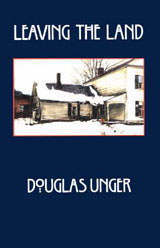
Praise for Leaving The Land:
Douglas Unger writes with great power and compassion about a unique, virtually undiscovered landscape in American literature. Leaving the Land is an authentic and deeply moving drama of people trying to hold on and go on. It’s a remarkable novel and one that will leave an indelible impression.
—Raymond Carver
This is the story of a remarkable survivor, the daughter of a turkey farmer, whose shattering, romantic entanglements are always doomed by her larger obsession: to hold on to the unlovable land which sapped her parents’ blood. Leaving the Land is, as well, the story of the disintegration of a town and its unforgettable inhabitants, and of the son who is the unwilling inheritor of his family’s lost dream. All of this is distilled with enormous grace and passion, humor and economy, and marks the most impressive debut of a young novelist.
—John Irving
Douglas Unger understands why the pure products of America go crazy, or to prayer, and details the heartbroke comedy of their journey in South Dakota. Sherwood Anderson, Faulkner, Wright Morris…Leaving the Land continues their tradition, and leaks rough authenticity and humor from every wound.
—William Kittredge
Leaving the Land resembles the best work of Zola, Norris and Dreiser. Like it, this novel rises out of the knowledge of a vast process which is measured and made significant by the characters forming and formed by it. Almost everything they do has in Unger’s book apocalyptic force.
—Richard Stern
Eloquent… At its best, this fine first novel courts comparison with Willa Cather’s classic and epic account of homesteading on the Western prairies, O Pioneers!. In language as luminous and rhythmic as the opening of The Rainbow by D.H. Lawrence.
—The New York Times Book Review
An affecting family story… A lot of true grit sifts through his pages… Unger obviously writes about what he knows: the coarse prairie soil called gumbo, the papery texture of clapboard in the last stages of dry rot, the astonishing stupidity of turkeys… Unger also understands what writers like Eudora Welty have learned, that the trick is to write what you don’t know about what you know. He intuits a generous range of emotions and draws stark credibility from the toppled rage of defeated men and lonely women.
—Time
Accomplished… unsentimental… very moving… Ungerπs portrait of Marge… is sharp, affectionate and darkly funny… A fine work of personal and national history about a critical part of our national character thatπs become an artifact.
—Newsday